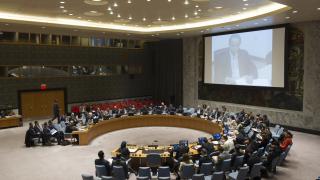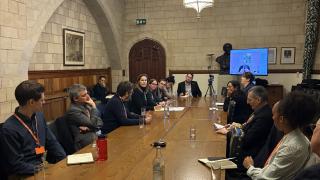
Continued military action in Yemen by both the Saudi-led coalition and the Houthi rebels is leading to the population’s increased militarisation, extensive proliferation of weapons, and widespread use of deadly landmines, according to reports by the United Nations Envoy for Yemen, Ismael Ould Cheikh Ahmed, at a Security Council briefing at the end of May.
The news comes as Yemen is in the grips of a humanitarian catastrophe. 7 million Yemenis are currently at risk of famine and malnutrition, while more than half of Yemen’s population lacks access to clean water, sanitation and hygiene services. The outbreak of diseases such as cholera has led to more than 500 deaths with over 60,000 suspected cases. The conflict has displaced at least 14.5 million people, as reported by UNICEF.
UNA-UK believes firm action is needed by the international community to avert further catastrophe in Yemen. As the leading voice or ‘penholder’ on Yemen at the UN Security Council, the UK should be at the fore of these efforts. Instead, as we argue in a recent Chair’s blog, the UK is exacerbating the crisis by failing to rein in its close ally Saudi Arabia and continuing to supply weapons being used in the conflict.
UNA-UK has worked on the Yemeni conflict for some time. At the beginning of March, the UK assumed the rotating presidency of the UN Security Council. UNA-UK wrote to UK Foreign Secretary Boris Johnson urging him to prioritise the humanitarian crisis in Yemen during that month.
Subsequently a session was held on the situation in the Middle East with a focus on Yemen on the 29 March. During his public statement, Matthew Rycroft, the UK Permanent Representative to the UN responded to a question on the UK’s position in the crisis by stating that “in my national capacity, I can say the UK, like the United States, continues to support the Saudi-led coalition.”
The Secretary General’s Special Envoy for Yemen admitted that “we are not close” to a peace accord due to a failure to compromise from the parties involved. He warned that calls for peace from woman’s groups, wider civil society and the international community is falling on deaf ears.
Emergency Relief Coordinator and Under-Secretary-General for Humanitarian Affairs, Stephen O’Brien, stressed that “this is not an unforeseen or coincidental result of forces beyond our control” but rather it is a direct consequence of actions of the parties and supporters of the conflict and “sadly, a result of inaction – whether due to inability or indifference – by the international community.”
The Campaign Against the Arms Trade (CAAT) highlighted those actions in a report which showed that the UK has licenced over £4.1 billion of arms to the Middle East since the May 2015 General Election. Two-thirds of UK arms exports go to the Middle East with Saudi Arabia being the largest buyer. These fighter jets and bombs are being used in the Saudi-led coalition’s ongoing bombing of Yemen, which has yielded more than 10,000 civilian casualties in the two years since it has begun.
Meanwhile the UK’s military support for the Saudi-led coalition looks increasingly isolated as attitudes towards the UK’s role in Yemen are shifting. This became clear during the General Election, when arms sales became a large topic of discussion. As our analysis of the manifesto positions showed, the Government's position is now at odds with an otherwise cross-party consensus in parliament against deepening the Yemeni conflict with continued arms sales.
UNA-UK argues that as the UK seeks to reshape its role internationally, it will find that the national interest best served by being an effective and responsible player on the world stage. This means consistently upholding the UK's international obligations, including on responsible arms trading, and by taking further actions in support of urgent humanitarian relief efforts.






